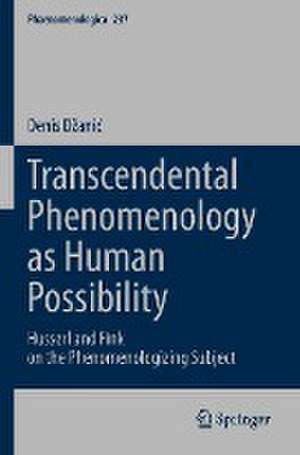Transcendental Phenomenology as Human Possibility: Husserl and Fink on the Phenomenologizing Subject: Phaenomenologica, cartea 237
Autor Denis Džanićen Limba Engleză Paperback – 10 feb 2024
Fink argued that phenomenology was essentially an activity beyond the horizon of human possibility and history. In contrast, Džanić illustrates how Husserl was looking for a way to theoretically unite the purity of transcendental insight with the existential reality and practical motives of the phenomenologist. Understanding the complex aspects of this debate is crucial for understanding the Crisis-period of Husserl’s thought. This text appeals to graduate students and researchers in phenomenology and related fields of philosophy.
| Toate formatele și edițiile | Preț | Express |
|---|---|---|
| Paperback (1) | 724.50 lei 6-8 săpt. | |
| Springer Nature Switzerland – 10 feb 2024 | 724.50 lei 6-8 săpt. | |
| Hardback (1) | 730.47 lei 6-8 săpt. | |
| Springer Nature Switzerland – 10 feb 2023 | 730.47 lei 6-8 săpt. |
Din seria Phaenomenologica
- 20%
 Preț: 825.73 lei
Preț: 825.73 lei - 13%
 Preț: 478.41 lei
Preț: 478.41 lei - 20%
 Preț: 629.14 lei
Preț: 629.14 lei - 13%
 Preț: 491.47 lei
Preț: 491.47 lei - 13%
 Preț: 542.56 lei
Preț: 542.56 lei - 20%
 Preț: 553.68 lei
Preț: 553.68 lei - 15%
 Preț: 633.02 lei
Preț: 633.02 lei -
 Preț: 417.02 lei
Preț: 417.02 lei -
 Preț: 417.90 lei
Preț: 417.90 lei -
 Preț: 418.29 lei
Preț: 418.29 lei -
 Preț: 389.49 lei
Preț: 389.49 lei -
 Preț: 425.42 lei
Preț: 425.42 lei - 15%
 Preț: 577.72 lei
Preț: 577.72 lei - 15%
 Preț: 527.32 lei
Preț: 527.32 lei - 15%
 Preț: 636.80 lei
Preț: 636.80 lei - 18%
 Preț: 952.89 lei
Preț: 952.89 lei - 18%
 Preț: 949.42 lei
Preț: 949.42 lei - 15%
 Preț: 643.65 lei
Preț: 643.65 lei - 18%
 Preț: 1225.48 lei
Preț: 1225.48 lei -
 Preț: 389.31 lei
Preț: 389.31 lei - 18%
 Preț: 1113.39 lei
Preț: 1113.39 lei - 18%
 Preț: 952.40 lei
Preț: 952.40 lei - 18%
 Preț: 1713.67 lei
Preț: 1713.67 lei - 18%
 Preț: 1551.73 lei
Preț: 1551.73 lei - 18%
 Preț: 1222.31 lei
Preț: 1222.31 lei - 18%
 Preț: 944.19 lei
Preț: 944.19 lei - 15%
 Preț: 642.51 lei
Preț: 642.51 lei - 18%
 Preț: 1112.78 lei
Preț: 1112.78 lei - 18%
 Preț: 891.80 lei
Preț: 891.80 lei - 18%
 Preț: 948.47 lei
Preț: 948.47 lei - 18%
 Preț: 1224.18 lei
Preț: 1224.18 lei - 18%
 Preț: 946.87 lei
Preț: 946.87 lei - 15%
 Preț: 578.84 lei
Preț: 578.84 lei - 15%
 Preț: 464.18 lei
Preț: 464.18 lei - 18%
 Preț: 839.56 lei
Preț: 839.56 lei
Preț: 724.50 lei
Preț vechi: 883.53 lei
-18% Nou
Puncte Express: 1087
Preț estimativ în valută:
138.64€ • 148.25$ • 115.59£
138.64€ • 148.25$ • 115.59£
Carte tipărită la comandă
Livrare economică 17 aprilie-01 mai
Preluare comenzi: 021 569.72.76
Specificații
ISBN-13: 9783031229886
ISBN-10: 3031229886
Pagini: 236
Ilustrații: X, 236 p.
Dimensiuni: 155 x 235 mm
Greutate: 0.35 kg
Ediția:1st ed. 2023
Editura: Springer Nature Switzerland
Colecția Springer
Seria Phaenomenologica
Locul publicării:Cham, Switzerland
ISBN-10: 3031229886
Pagini: 236
Ilustrații: X, 236 p.
Dimensiuni: 155 x 235 mm
Greutate: 0.35 kg
Ediția:1st ed. 2023
Editura: Springer Nature Switzerland
Colecția Springer
Seria Phaenomenologica
Locul publicării:Cham, Switzerland
Cuprins
Chapter. 1. Introduction.- Chapter. 2. Husserl and Fink: From Philosophical Systematics to a ‘Phenomenology of Phenomenology.- Chapter. 3. The ‘Who?’ and the ‘Why?’ of Phenomenology: Theoretical Claims and Claims of Concrete Reason.- Chapter. 4. Formulating the Task Anew: Toward a Transcendentally Clarified ‘Higher Humanity.- Chapter. 5. Conclusion.
Notă biografică
Dr. Denis Džanić obtained his doctorate in philosophy from the University of Vienna in 2021, and is now working at the Department of Philosophy at the University of Graz. He works on systematic and historical topics in the fields of phenomenology and philosophy of action.
Textul de pe ultima copertă
This book focuses on Edmund Husserl’s philosophical collaboration with Eugen Fink which took place in the early 1930s, and shows how their disagreement over the nature, origin, and aim of phenomenology led to a crucial divergence on the issue of who was engaging in phenomenology, and with what motivation. It provides a philosophical investigation of a key moment in the development of Husserl’s late phenomenology. The author claims that Husserl’s meta-phenomenological exploration of the theoretical and, importantly, practical underpinnings of the transcendental investigator leads him to affirm their humanity and, ultimately, to adopt an ethically charged ideal of “higher humanity” as telos of phenomenology.
Fink argued that phenomenology was essentially an activity beyond the horizon of human possibility and history. In contrast, Džanić illustrates how Husserl was looking for a way to theoretically unite the purity of transcendental insight with the existential realityand practical motives of the phenomenologist. Understanding the complex aspects of this debate is crucial for understanding the Crisis-period of Husserl’s thought. This text appeals to graduate students and researchers in phenomenology and related fields of philosophy.
Fink argued that phenomenology was essentially an activity beyond the horizon of human possibility and history. In contrast, Džanić illustrates how Husserl was looking for a way to theoretically unite the purity of transcendental insight with the existential realityand practical motives of the phenomenologist. Understanding the complex aspects of this debate is crucial for understanding the Crisis-period of Husserl’s thought. This text appeals to graduate students and researchers in phenomenology and related fields of philosophy.
Caracteristici
Illuminates a critical, complex, and still insufficiently researched stage of Husserl’s development Focuses on Husserl’s collaboration with Fink and their disagreement over phenomenologizing activity Develops an account of the habitus, practical motivations, and goals of the transcendental ego
